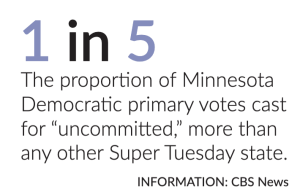
Voting uncommitted sends a message to candidates, asking them to reconsider their stances on particular issues.
In the most recent Minnesota Democratic presidential primary election nearly 46,000 or 18.8% of voters made the concerted effort to vote “uncommitted,” according the the Secretary of State official results, in response to President Biden’s position in the current Israel-Hamas War.
An uncommitted vote in a primary means that although the voter supports a certain political party, they are not committed to any of the candidates. While some uncommitted voters are truly uncertain about which candidate they’d like to choose, many were using their vote in this primary as a protest against President Joe Biden’s response to the Israel-Hamas war.
Minnesota was just one of several states where there was debate as to whether or not these protest votes were effective. In Michigan, almost 79% of majority-Arab precincts voted uncommitted, according to the Department of State official results. While it is difficult to provide quantitative evidence that protest voting will change policy, these uncommitted voters are signaling to President Biden not to take their vote for granted in the general election.
With Joe Biden running essentially unopposed, except for longshot Representative Dean Phillips, Biden was undoubtedly going to win the nomination. Therefore, the uncommitted voters were not trying to oust Biden but rather were trying to exert some pressure on him to change his Middle Eastern policies. With a tight general election ahead, President Biden will need to coax as many uncommitted voters as possible, lest they stay home on election day. While it is difficult to quantify the impacts of voting uncommitted, there are no negative impacts. If and when you vote in future elections, it is important to understand that voting uncommitted can also be an effective option. It might just send a message.
Commit to a cause. Commit to a candidate. But most of all, commit to voting without the commitment.